Racheline Maltese's Blog, page 20
July 28, 2015
Reality is usually the thing outside the frame
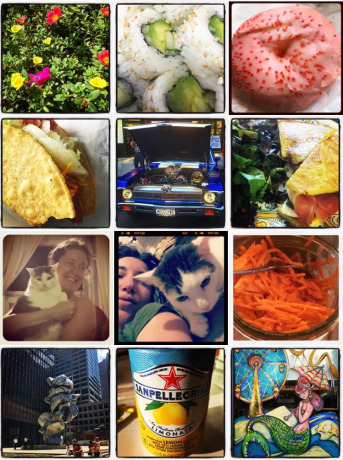 Lately, I’ve developed a pretty intense Instagram habit. While it seems silly to take photography done from a cell phone camera and routed through any number of pre-set filters seriously, I’m sort of really into it. Photography is a thing I dig because of how it’s a form of pattern recognition used to freeze a moment and evoke an emotional response.
Lately, I’ve developed a pretty intense Instagram habit. While it seems silly to take photography done from a cell phone camera and routed through any number of pre-set filters seriously, I’m sort of really into it. Photography is a thing I dig because of how it’s a form of pattern recognition used to freeze a moment and evoke an emotional response.
The thing about Instagram — and Pinterest or Tumblr or Facebook or any platform people use to visually documents their own lives — is that it becomes very easy to make your life look perfect. Today I zoomed in on a piece of gluten-free cinnamon cake so you couldn’t tell it got smushed at the bottom of my partner’s messenger bag and then stuck in the freezer for a few days. Last night, I posted an absurd picture of our black cat Smudge as if I’d failed at taking her photo in a hipsterish and intentional way. Nope, that was really the best I could do.
Like everything else I do online, Instagram is a very specific curation of my life, and one that can give a lot of false impressions. It’s a highlights reel, not a collection of outtakes. One that suggests I’m possibly a trendsetting world-traveler who cares about living a healthy lifestyle as opposed to a chick with a genetic disease who really likes cake and is terrified of flying. Also the black cat is an unsightly drooler.
But how is all of this relevant to the writing? Well, because it’s sort of exactly the same. If you follow this blog you see the stories we’re excited about, the things we’ve sold, and the events we go to. You don’t see the thing we’ve revised 27 times, the project we’re desperate to write but don’t have time to, the industry shenanigans that make us privately holler with rage, the struggle to write when it’s 97 degrees outside and my laptop battery is trying to burn my thighs, or the fact that the unsightly drooling cat tends to need my attention at the most narratively pivotal moments.
In the face of that reality, as a writer and an Instagram user, curating my life is often the sort of thing that keeps me from curling up in despair. But it’s also important for me not to drink the Kool-Aid, about my own curated life or about anyone else’s.
If you’re struggling to make words and/or get yesses — and we all are at least some days and probably most days — you might want to take time to remember what everyone else tends to cut out of the frame. Or how totally awesome your life looks to other people with just a hint of curation.
(Want to follow my instagram? It’s mostly food, cat pictures, and cemeteries and you can find it at https://instagram.com/rachelinem/)


July 27, 2015
This weekend: OutWrite LGBT Book Festival in Washington DC!
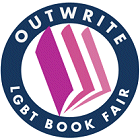 On Saturday, August 1, Erin & I will be vending at the OutWrite Book Festival in Washington DC. As someone who went to university in DC and worked at the now defunct, but completely legendary LGBTQ bookstore Lambda Rising, I’m super excited to be a queer author with queer books to sell in DC this coming weekend.
On Saturday, August 1, Erin & I will be vending at the OutWrite Book Festival in Washington DC. As someone who went to university in DC and worked at the now defunct, but completely legendary LGBTQ bookstore Lambda Rising, I’m super excited to be a queer author with queer books to sell in DC this coming weekend.
The book fair is actually part of a two-day celebration of LGBTQ lit by The DC Center. Readings, workshops, and more will be happening from July 31 – August 1. One our of publishers, Dreamspinner Press is a Silver Sponsor of the event, and we’ll be there with paperbacks of our Torquere Press titles (the Love in Los Angeles series and more) and swag, as well as anthologies from Cleis and Zumaya that we’re in. If you would also like me to have any of my pop-culture books on hand, please send up a flare.
If you’re in the DC area on August 1, please come say hi. We love to meet our readers, and the event is free!
OutWrite Book Fair
August 1, 11:00 AM to 5:30 PM
The DC Center
2000 14th Street NW
Washington DC
Also, please stay tuned as we finalize the last of our 2015 appearances, which currently look likely to include New York City, and Denver, CO.


July 25, 2015
Coming Soon: Sample and Hold
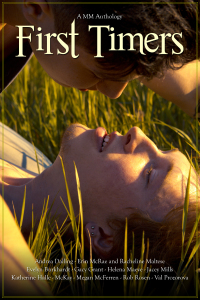 On August 12th, we’ll actually have two new releases — Twelfth Night (Love’s Labours 2) from Dreamspinner Press and “Sample and Hold” as both an individual title and part of the First Timers anthology from Torquere Press. The full anthology will be available in both ebook and paperback formats.
On August 12th, we’ll actually have two new releases — Twelfth Night (Love’s Labours 2) from Dreamspinner Press and “Sample and Hold” as both an individual title and part of the First Timers anthology from Torquere Press. The full anthology will be available in both ebook and paperback formats.
Set in Nashville, “Sample and Hold” is a 3,400 word m/m erotic romance about about a topic we can never resist — the moment before someone’s life changes forever.
Nate may have a crossover hit with his first single, but he’s also a 19-year-old virgin who’s about to come out in Rolling Stone. But when Carson, the cocky sound engineer who’s helped put him on the map issues one more challenge, Nate sees an opportunity he can’t refuse.


July 22, 2015
Why universal adjunct hell?
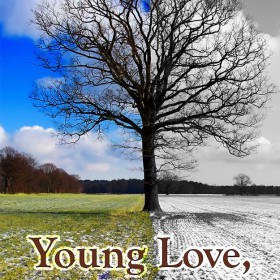 Being an adjunct professor, as Carl and the three other professors he shares an office with are, is kind of a pit. They work insanely long hours, teaching and grading, before they even get to spend time on their own research. It’s a largely thankless job, and it pays miserably. And they rarely get the opportunity for a tenure-track job, like the one Carl has — we’ve fudged that a little.
Being an adjunct professor, as Carl and the three other professors he shares an office with are, is kind of a pit. They work insanely long hours, teaching and grading, before they even get to spend time on their own research. It’s a largely thankless job, and it pays miserably. And they rarely get the opportunity for a tenure-track job, like the one Carl has — we’ve fudged that a little.
In our short story, Carl, our protagonist, is trying to navigate a relationship with Phil — who is both Carl’s student, and nearly two decades older than Carl — while navigating his own prospects for tenure. Just before the story opens, Carl’s had his tenure hearing before his faculty committee, and is now just waiting, impatiently and increasingly frantically, for word on whether he has tenure — and a job — or not.
But in the world of academia, in the US at least, a career spent as an adjunct, without ever getting the opportunity for tenure — i.e., adjunct hell — is an increasing reality for post-doctoral students. And the trials and tribulations of that life — the misery of the hours, the frustration of the bureaucracy, the annoyance of the really obnoxious libertarian Carl’s forced to share an office with — makes for a good backdrop on which to paint our story of May/December relationships, and highly dubious professional choices.


July 21, 2015
RainbowCon Roundup!
 Erin and I are just back from RainbowCon and trying to catch up with everything in the many lives that we both live. But I wanted to get down some quick thoughts about what we learned from the event, while they were still relatively fresh in our heads.
Erin and I are just back from RainbowCon and trying to catch up with everything in the many lives that we both live. But I wanted to get down some quick thoughts about what we learned from the event, while they were still relatively fresh in our heads.
1. Everyone wants to be welcoming — not everyone knows how. That’s okay. This is basically what it says on the tin, and is directed at me as much as anyone else. Connecting with pre-existing communities is hard. Letting people into pre-existing communities is hard. This went for the con, where it often seemed like everyone already knew each other, and our own little group of friends and partners.
2. We have got to talk about this penetration problem. Quite by accident, Erin and I both read passages at our Naughty Bedtime Stories readings that didn’t contain penetration. And we were the only two readers to do that. Now, don’t get us wrong, we write a lot of penetration. I, for one, will totally confess to loving to write characters who love to bottom. But we work really hard not to do that all the time and not all of our books and stories contain penetrative sex.
Penetration isn’t inherently more meaningful than other sex acts. And it’s not more popular. Anal sex does not equal gay sex and gay sex does not equal anal sex, and if you use the phrase “real sex” to mean penetrative sex involving individuals of any gender, I would ask you to rethink that. Talking to Anastasia Vitsky revealed this is an issue in F/F fiction too.
This isn’t a “don’t find this hot” plea, but rather a “can we shake it up and eroticize more things while also not making declarations about what’s ‘real’ sex that can be hurtful to real people?” thing.
3. Swag is super cool, but I am not sure it matters in the end. Lots of people brought incredibly cool giveaways designed to get people’s interest, start conversations, and retain their attention, but I was overwhelmed by the stuff I needed to bring home, the stuff I didn’t feel good about throwing away, the stuff I didn’t need cluttering my apartment, and a general sense of horror at the environmental impact.
And look, we have swag. We have tons of postcards. We have our Love in Los Angeles silicon bracelets. We have some other fun stuff we want to do. But I really left RainbowCon second guessing a lot of that, and feeling good about that second guessing. Everything we produce now I really want to think about very intensely in terms of whether they are useful, memorable, practical, and degradable. I think very little of the swag any of us are producing is really hitting all the metrics it could.
4. On the continuing issue of paperback demand.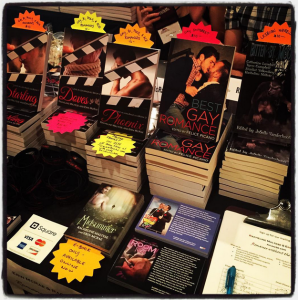
5. Some books need to find the right audience. Other books just need to find the audience. We knew this, but we keep learning this. Love in Los Angeles works for particular readers, some of whom are in the M/M audience space, many of whom are not. The Love’s Labours books are way more accessible to way more people, especially in the M/M space. So there it’s less a matter of finding the exact right people and just letting folks know it’s out there. We are still trying to figure out how to do both. Everyone can say that their books aren’t quite like everyone else’s books, but specificity matters. And we’re still working on that.
6. The wall betwee F/F and M/M needs to stop. I get it. Not everyone who reads M/M wants to read F/F and vice versa. But the disparaging remarks, the disgust about bodies that don’t turn you on (and I notice this directed at female bodies and F/F and M/F fiction more than at male bodies and M/M fiction) really needs to chill out. Also debates about whether lesbians or gay men have it harder out there. These things aren’t clear cut. Can we all at least act like we’re on the same team regardless of how wide or narrow our reading tastes?
7. Identity and writing LGBTQ (romance) fiction. I’ve written about this before, and the issue isn’t going away for me any time soon. I do think anyone should write anything and hopefully do research and figure out how to write the stories they want to write as best they can and then the audience and marketplace and reviewers will make decisions about how that went. And look, I get it really sucks having to keep what you write or read a secret. I am trying to have all the sympathy in the world about that. And I do get how such things could give a straight person who reads LGBTQ fiction insight into the experience of being closeted. But it’s not the same thing, and I would like it if sometimes people could be a little bit more thoughtful about this.
8. Professionalism and family atmosphere — I think we need to think about how we can have both. My nature is to default to a certain sort of professionalism. I over- rather than under- dress. I speak in a businesslike way. I prepare for panels. This isn’t good or bad, because sometimes it’s a defense mechanism. But I really think that while I have to work on the friendly and accessible thing, our community as a whole would benefit from some more attention to professionalism. Family/community atmosphere and professionalism don’t have to be in opposition. We can be accessible and familiar and a well-oiled machine. We just all have to do work to get there.
9. “Everyone is interesting.” Author Heather Rose Jones said this to us when she joined us at dinner out last night at the conference and it really stuck out to me, both because it’s completely true, and because it’s a way to come at what’s socially/culturally foreign to you without judgement. It’s a way of listening, and spurring on conversation, and I wish we had had that conversation at the beginning of the con instead of the end. Because let’s be fair, I was absolutely out of my element in a number of ways at this event, and I didn’t always know how to navigate it.
10. Managing expectations. Basic life skill. Expect nothing. Seek everything. Rejoice in the results.
Have you got learnings from this or other con experiences? If so, we want to know!


Our utter inability to resist (or avoid) farce, in art and in life
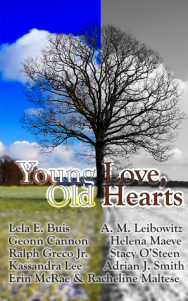 One of my and Racheline’s favorite story elements to play with is farce. Sure, we write a lot about death and coping with the difficult realities of relationships and life, but we even in our most serious stories we keep coming back to farce. After all, there can be farcical elements even in the midst of crisis, especially when crises keep happening right on top of each other.
One of my and Racheline’s favorite story elements to play with is farce. Sure, we write a lot about death and coping with the difficult realities of relationships and life, but we even in our most serious stories we keep coming back to farce. After all, there can be farcical elements even in the midst of crisis, especially when crises keep happening right on top of each other.
“Adjunct Hell” is no exception. Carl is waiting to hear back from the tenure committee on whether he still has a job or not. He’s also conducting — and trying to keep secret — a relationship with his student, Phil, who’s a couple decades older than he is. Add in gossipy students, meddling colleagues, and Phil’s ex-wife who just happens to know the dean, and farce becomes essentially unavoidable.
Farce is more than just a hilarity-inducing plot device, though. In life, everything happens at once, all the time. Often, disastrously. Like the Thanksgiving where I, in one 24-hour period, got stuck in a snowstorm driving home, was trapped in the middle of really intense family drama over perogies (my father-in-law is Polish), misunderstood an email and thought all of my friends hated me, and got Racheline’s and my first novel contract — while I was at a bar.
The contract aside, that was a weekend I could have done without. But still, even in the midst of it all, while the terrible kept piling on, it was kind of funny. Farce is all about that. It’s the way we make one of the most pain in the ass truths of life part of our story while also keeping it — the story and our lives — fun.


July 20, 2015
Romance in Academia: When the two don’t (and when they really, really do) mix
 We knew “Adjunct Hell” was going to be about academia even before we knew it was going to be an age difference story. I mean, sure, it took us about .5 seconds to go from “we should write a story set at a college!” to “professor and older student!” because that’s how we roll, but still, writing about the world of academia was a big driver for us.
We knew “Adjunct Hell” was going to be about academia even before we knew it was going to be an age difference story. I mean, sure, it took us about .5 seconds to go from “we should write a story set at a college!” to “professor and older student!” because that’s how we roll, but still, writing about the world of academia was a big driver for us.
We like writing backstage stories, and academia is one of those worlds — like film, or professional sports, or politics — where the way things work is not actually the way most people think they work. And they definitely don’t work the way they do on TV or in the movies. Academia is full of drama and interpersonal conflict. It’s long, long, long hours, endless problem sets to grade, and never enough time for your own research. It’s a lot of career uncertainty. It’s definitely never enough pay.
I got my master’s degree while working a full-time dayjob, and I look back on those years and wonder how I survived. But in the high-stakes, 80-hour-a-week of academia, there’s a lot of space for personal drama — and personal hilarity.
Because really — a professor dating a student, even a student a couple of decades older than himself, is a really bad idea. And the potential for farce, terrible personal choices, the and comedic joy of interfering officemates was something we just couldn’t pass up. We like putting our characters in tough situations, and watching Phil and Carl struggle to keep their relationship secret while respectively trying to also do their homework and not tank their chances at tenure, was a joy.


July 19, 2015
Adjunct Hell and our ongoing fascination with age difference narratives
 Like many of our stories, “Adjunct Hell” is, among other things, an age difference story. Our interest in writing relationships with age differences comes from a lot of difference places. Sometimes, it’s just fun (and sexy) to write stories about a young adult discovering relationships and sexuality with someone with more experience. Other times, the age difference creeps into the story less overtly, so that we can each have a character we relate to since, as co-writers, there is a sixteen year age difference between us.
Like many of our stories, “Adjunct Hell” is, among other things, an age difference story. Our interest in writing relationships with age differences comes from a lot of difference places. Sometimes, it’s just fun (and sexy) to write stories about a young adult discovering relationships and sexuality with someone with more experience. Other times, the age difference creeps into the story less overtly, so that we can each have a character we relate to since, as co-writers, there is a sixteen year age difference between us.
Increasingly, however, I’ve begun to suspect that the reason we write age difference so much is because of some of the realities of being queer people. For me, as someone who grew up in New York City in the 70s and 80s and was active in protests related to AIDS funding in the 80s and 90s, I am always conscious of the hole in the gay community created by AIDS. That hole has been and continues to be devastating.
One of its consequences is an interruption of how our cultural history gets transmitted. With arguably much of an entire generation missing, relationships with significant age gaps are likely more common. They’re also a way to navigate that hole, and ensure the continuity of culture and community. This isn’t something I have the statistics on, but it certainly feels truthful to me in terms of the relationships I see amongst my friends and peers.
The other reality is that same-sex relationships come with less structural inequality. When you’re not worried about the sexism in our culture coming home to your relationship, it can make other forms of power imbalances — including big age differences — easier to navigate.
For us “Adjunct Hell” was a way to look at how different power dynamics interact. By writing about an older student and a young professor we got to examine the power dynamics that we all deal with in whatever relationships we engage in from a queer and complex perspective.


July 18, 2015
Adjunct Hell: Why We Love Mixed-Orientation Anthologies (And why you should, too!)
 One of the things that has Erin and I looking so forward to reading the Young Love, Old Hearts anthology is that it is a mixed-orientation anthology with both M/M and F/F stories. These mixed-orientation anthologies often seem to us to be the exception rather than the rule. And, frankly, that’s fair: Many readers are only interested in either M/M or F/F relationship narratives.
One of the things that has Erin and I looking so forward to reading the Young Love, Old Hearts anthology is that it is a mixed-orientation anthology with both M/M and F/F stories. These mixed-orientation anthologies often seem to us to be the exception rather than the rule. And, frankly, that’s fair: Many readers are only interested in either M/M or F/F relationship narratives.
But, the fact is Erin and I enjoy reading and writing both, and too often we feel like women who love women get less focus in LGBTQ publishing. As bi women that frustrates both us a lot, even though we often write stories — including our piece in YLOH — about men.
So basically, we think this anthology is awesome. And we’re excited to read it along with you, not just because a story we wrote is included in it, but because stories that also reflect the wide range of our own experiences are included in it. We hope you get a kick out of these stories too and help spread the word about how much fun mixed-gender and mixed-orientation anthologies can be.


July 17, 2015
May/December Relationships and power dynamics: flipping the scales
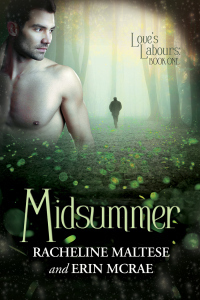 Power dynamics are often a huge issue in May/December relationships. For some readers, that’s the draw. For others, it’s a turnoff. For us, with Midsummer, which features a couple with a 17 year age difference (they’re 25 and 42), it seemed like something really fun to play with.
Power dynamics are often a huge issue in May/December relationships. For some readers, that’s the draw. For others, it’s a turnoff. For us, with Midsummer, which features a couple with a 17 year age difference (they’re 25 and 42), it seemed like something really fun to play with.
John, our 42-year-old, has the benefit of life experience, including a marriage and divorce behind him. But his love story in this book is his first one with a man. For all the experience he does have, so many things — including how other people perceive him when he’s dating someone of the same sex — is new to him.
Meanwhile Michael, our 25-year-old, may be young, but he’s been happily around the block a few times. He may not be good at fighting fair or having difficult relationship conversations, but he’s been out and comfortable with his sexuality since he was a young teenager. A lot of the things that seem new to John are old hat to him.





